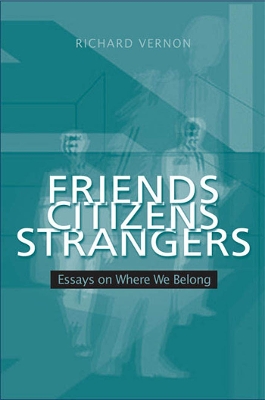All human relationships are not created equal; attachments between close associates ('friends'), compatriots ('citizens'), and humans ('strangers') vary greatly in terms of their character and importance. From a critical standpoint, though, which type of attachment should take priority? Are we morally obliged to think of ourselves first and foremost as members of the human race, or should we prioritize our allegiance to a particular nation, or our personal friendships above our humanity? In Friends, Citizens, Strangers, Richard Vernon considers these questions, and addresses the implications of various answers. Vernon grounds his investigation in the work of Locke, Wollstonecraft, George Eliot, and J.S. Mill in England, and Rousseau, Comte, Proudhon, and Bergson in France. He explores what these thinkers have to say about the theme in question, and in turn what that theme reveals about basic issues in their own work.
Vernon also turns to contemporary thought to explore the issue: the idea of a 'crime against humanity' as an assertion of the moral standing of strangers, the idea of moral partialism, the claim that compatriots inherit historical obligations, and the 'associativist' view that obligations are of two distinct kinds, partial and universal. Finally, drawing on both the historical and contemporary sources discussed, Friends, Citizen, Strangers proposes a solution: a moderate form of cosmopolitanism that finds a place for multiple levels of attachment and association. This work will prove useful not only to scholars of the authors discussed, but also to those interested in ethics and political theory more broadly.
- ISBN13 9781442675063
- Publish Date 14 May 2014 (first published 31 December 2005)
- Publish Status Active
- Publish Country CA
- Imprint University of Toronto Press
- Format eBook
- Pages 336
- Language English
- URL http://degruyter.com/search?f_0=isbnissn&q_0=9781442675063&searchTitles=true
